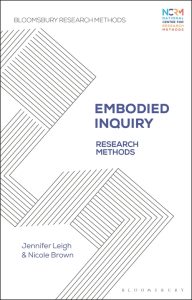This is an extract from a guest post Dr Jennifer Leigh and I wrote for the SAGE MethodSpace. In our guest post we outline some of the principles of Embodied Inquiry, as developed in our book.

Embodied Inquiry is an approach to research that privileges the lived, embodied experiences of the researcher and the researched. A fairly simple sentence to write for us, who have lived, breathed, worked on and in Embodied Inquiry, and utilised it as a research approach for years. However, for the uninitiated we are very aware that even in that one sentence there are many words that seem like jargon, or have ambiguous meanings, with the result that it is hard for a researcher to know if what they are doing is actually Embodied Inquiry or not. This is true even more if you are new to the whole idea of doing research and what research actually looks like or feels like.
So an Embodied Inquiry would mean an inquiry into something where at least one part of the research process foregrounds that embodied self-awareness, of either the person or people doing the research, or those who are being researched. The focus here is on embodied self-awareness. This does not mean that Embodied Inquiry needs to be done “in person”. As the Covid-19 pandemic has hit, obviously a lot of research work was moved into an online, virtual space that is experienced as disembodied. However, just because we may live a felt experience of disconnect, we still are and have bodies and can pay attention to them and the feelings, sensations, and emotions that arise from them.
Leave a message: